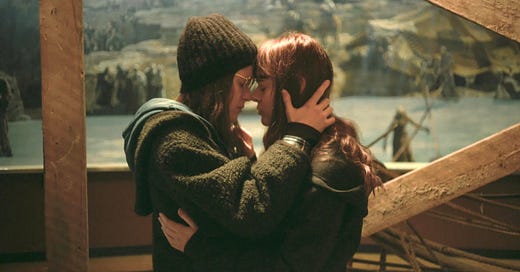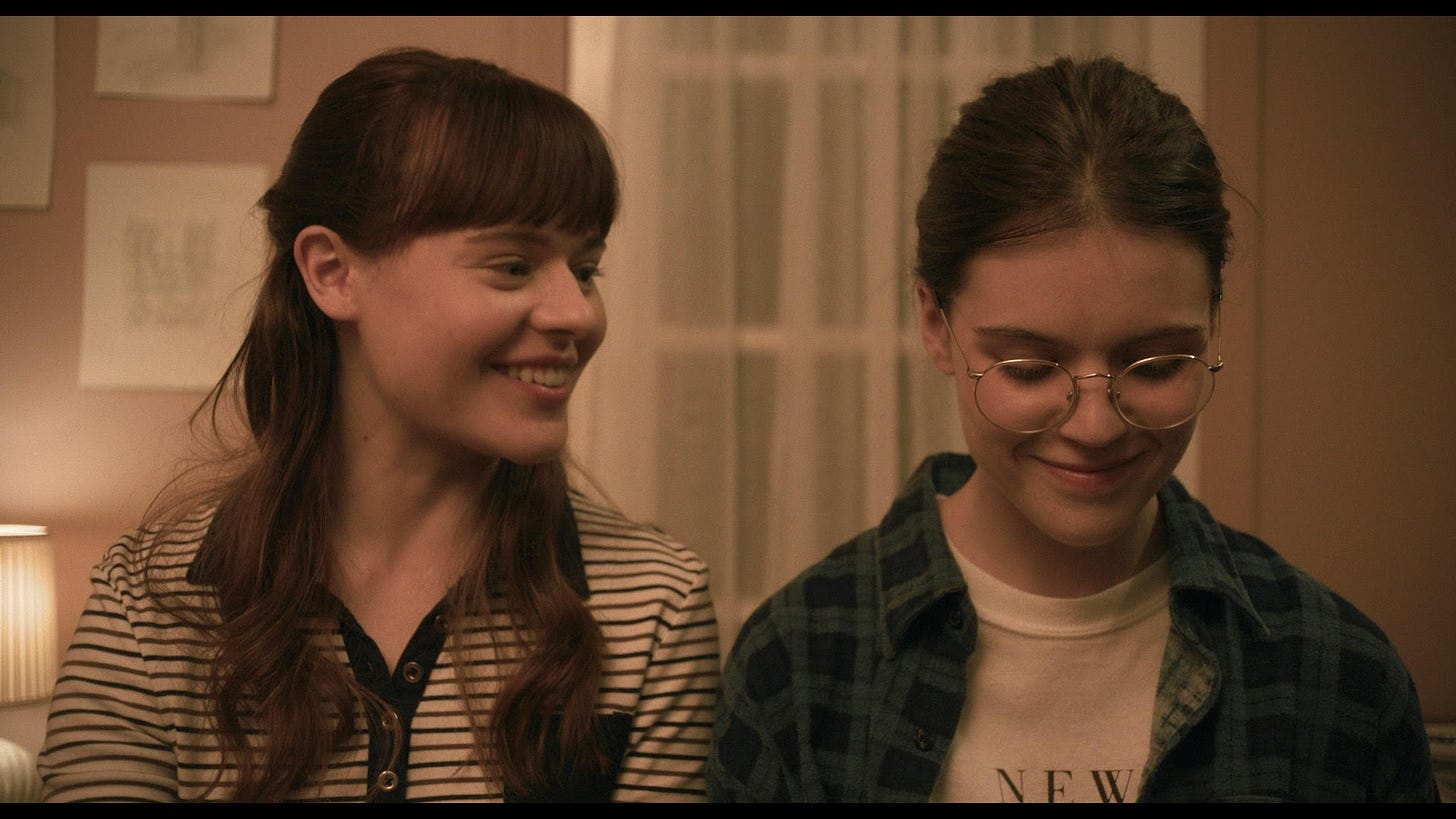'You Can Live Forever' Should Be The Next Lesbian Film On Your List
An interview with director Sarah Watts
This is the Sunday Edition of Paging Dr. Lesbian. If you like this type of thing, subscribe, and share it with your friends. A paid subscription gets you more writing from me and will help me keep this newsletter afloat. Consider going paid!
This week I was lucky enough to get the chance to speak with filmmaker Sarah Watts, the director of a new film called You Can Live Forever. The film follows Jamie (Anwen O’Driscoll), a lesbian teen in the early 1990s. Jamie is sent to live with her aunt and uncle, who are part of a Jehova’s Witness community, where she meets Marike (June Laporte), the devout daughter of a Witness elder. As Jamie and Marike grow close, their relationship sends shockwaves through the community, and the girls must make difficult choices that will determine the rest of their lives.
(If this description isn’t compelling enough for you, I’m here to report that the movie also features what is probably the most erotic baptism ever captured on film.)
Because of its subject matter, one might be tempted to place You Can Live Forever in conversation with other films about queerness and religion like Disobedience, or 90s teen dramas like The Miseducation of Cameron Post, but the film feels unique enough that these comparisons aren’t really necessary. In fact, Watts told me that the biggest influences for the film were actually Scandanivan filmmakers like Lukas Moodysson (who directed the queer classic Show Me Love), Joachim Trier (known for Thelma and The Worst Person In The World), and Roy Andersson, who is best known for his 1970 debut A Swedish Love Story.
Though many viewers are likely to be unfamiliar with the Jehova’s Witness community prior to watching the film, it’s hard not to become invested in the characters and their stories right away. Jamie, who Watts described to me as a “gay, pot-smoking, Cocteau-Twins-listening teen,” is a totally lovable rebel, while her love interest, Marike, is just as captivating and complex. Watts told me she is especially proud of the work of the two leads and the film’s cinematographer, Gayle Ye, all of whom are queer themselves.
You Can Live Forever premieres this week at the Tribeca Film Festival, and, luckily for us, you can watch it online starting Monday, June 13. I encourage you all to check it out if you’re looking for something new to watch, and especially if you’re interested in supporting independent queer films.
Keep reading to check out my interview with Watts and discover how the film came to be.
How important was it to you to set the film in the 1990s? What do you think was unique about the experience of queerness during that time? (As someone was born in the '90s but didn't really get to experience it, I've always been fascinated with the decade – maybe in part because I love the music and pop culture from that era.)
My co-writer Mark and I realized very early on in the process of writing this story and these characters, that we had to set it during the time that we were teenagers. I'm really not sure that I could tell an authentic coming-of-age story that's set now, since it's a wildly different experience being 17 in 2022 than it was in 1992. We also really wanted our world to be free of the internet and cellphones, so that our angsty teens just had to endure their angst by mournfully looking out at the sea instead of doom scrolling. Even though the story is fictional, I considered my own experiences as a queer teen when writing Jaime - we wanted her to be comfortable in her sexuality, but to also have that built-in sense of caution that felt necessary thirty years ago.
What was the most challenging part about getting the film made?
In terms of arts funding, we are very lucky to live in a country that earmarks a decent amount of money every year to support emerging filmmakers. One of the funding partners was Telefilm, who have committed 50% of their yearly funding to women filmmakers. We were also funded by SODEC, which funds art and culture development in Quebec - they were huge supporters of our film, creatively and financially. We were fortunate to work with an incredible producer, Rob Vroom (Prospector Films) who did remarkable work to ensure we were able to make the film we wanted to make. The MOST challenging part of making this film was making it during a global pandemic. COVID pushed our shooting dates back six months, and when we were finally able to shoot it was with fairly strict protocols in place.
Was casting queer actors important to you or was it just a happy accident?
It's funny, I had seen Anwen (who plays Jaime) in a Netflix show, and immediately had a feeling about her - a very familiar, very gut type feeling - that she was our Jaime. We asked our wonderful casting director Jesse Griffiths to see if she would send in a tape, which she obviously did. It was only after she was cast that she told us she was queer. I like to think that I knew on a subconscious level though haha.
June (Marike) talked openly about her queerness quite early on in the casting process; she'd had a religious upbringing which made Marike feel like a part she could (and did) truly inhabit.
In general, it was important to us to have queer women in key creative roles for this film. Two examples, our cinematographer Gayle Ye and costume designer Kayleigh Choiniere both brought so much to the table artistically and were able to draw on their own queer experiences to help build this world with us. It made for a very safe-feeling and very gay-feeling set, which was a dream.
What was the collaboration process like between you and your co-writer and co-director, Mark?
Mark and I have been very good friends for over a decade and have been creative partners for eight of those years. He and I had many conversations about my upbringing as a JW, which completely fascinated him and inspired the writing of the screenplay. We share similar tastes in film, books, music etc and had many parallels in our lives growing up, even though our experiences were very different in some ways. He and I are almost exactly the same age (I'm three weeks older) which was really instrumental in the process of recreating an era that we each had strong memories of. When we found out that we'd secured rights to use a Cocteau Twins AND a Breeders song in our film, our brains exploded at the same moment.
On set, it was wonderful to be creative partners and to be directing the film together. Being a director can feel like being pulled in a million directions at once, you're constantly answering questions and making decisions, and to have another person sharing that role is kind of amazing! For example, I could spend time discussing a scene with our actors while Mark and Gayle worked out a complicated shot; it really just made our film set a pretty chill environment.
What do you think has been missing from the conversation about the experience of growing up queer within a religious group?
One thing that was really important to Mark and I, was to tell a story that dug a little deeper than "I'm queer and I'm being oppressed by a religion." The setting of the film is a repressive environment, of course, but we didn't want the repression to be THE story. I feel like the character of Marike, her way of thinking, the decisions she makes - she is a different type of person than I've seen in a film before, and her experience of being secretly queer in this supportive, loving community with a belief system that she is deeply, emotionally invested in... that was the kind of character we wanted to create and try to understand.
What was really amazing was learning more about her from June's performance, which taught me things about that character that I had never considered. Anwen did the same thing with Jaime, making that character her own in such an organic way that she evolved Jaime in unexpected, wonderful directions. It was such a gift to work with all the phenomenal actors we had. I can't say enough about them.
How did you approach the idea of introducing audiences to a Jehova's Witness community, something most viewers probably aren't very familiar with?
When we first started talking about how to tell this story, we didn't even want to use the words "Jehovah's Witnesses", just like we don't ever say quite where they are or what year it is. We wanted to be a bit vague about all that, but as we wrote it we realized it would be impossible to avoid directly referencing the religion.
As I mentioned, it was vital to us that we not take the easy road of painting them as the clear antagonists. I grew up with Jehovah's Witnesses as my community. These were not unkind people, in fact, quite the opposite. Most people think about JWs as the door-to-door preachers who refuse blood transfusions, but to me, they were other families, just like mine, that we went camping with in the summer. That said, as much as they were integral to my life, I never felt like I was truly a part of it all. I knew deep down that I didn't believe in the doctrine, and I knew from a fairly young age that I was a lesbian, and that I wouldn't stand for the whole "love the sinner, hate the sin" thing. So, for much of my life in that world, I felt like an observer, which is how I hope an audience will feel about getting a glimpse into this little-known, and even less understood religion.
How important is Jamie's supportive friend, Nathan, to the narrative of the film? Was Nathan always in the script?
Nathan was a constant in the script from day one. We really wanted Jaime to have an anchor to the real world, someone with whom she could be entirely herself in small moments of secular respite. We were also really excited to write a male friend character who was cool just being friends with Jaime. Hasani, who played Nathan, really loved that aspect of his character - and he and Anwen got along in real life just like Nate and Jaime did.
Watch You Can Live Forever online starting Monday, June 13, at the Tribeca Film Festival.








This looks great, thanks!